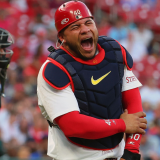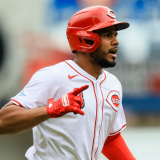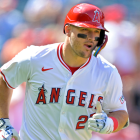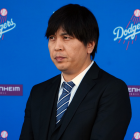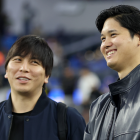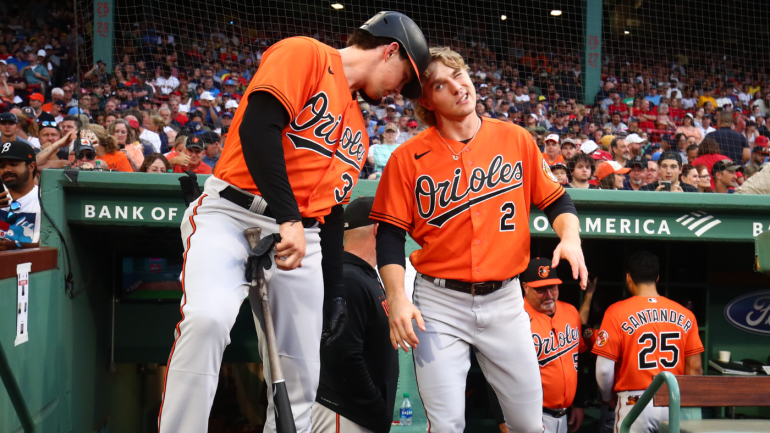
The Orioles will soon have a new owner, according to various reports that surfaced on Tuesday night. David Rubenstein, a Baltimore native and billionaire who made his fortune in private equity, is expected to purchase the franchise from the Angelos family for $1.725 billion.
Rubenstein's group will buy 40% of the Orioles in the short term, and then the remainder once longtime owner Peter Angelos dies. (If that strikes you as morbid, well, it is; it's also financially driven, as waiting until after Peter dies will reduce the capital-gains tax hit for the remaining members of the Angelos family.)
The deal is not yet official and there is no timetable on when it will become so. Nevertheless, it is expected to be discussed at next week's MLB owners' meeting.
Presuming Rubenstein does officially buy the Orioles for $1.7 billion, it will mark the third-richest franchise sale in Major League Baseball's history. Only the New York Mets and Los Angeles Dodgers were more lucrative. Both of those clubs topped the $2 billion mark.
Besides Rubenstein's own Orioles fandom, just what has convinced him this deal is worth making? Below we've identified five factors that may have influenced his thinking.
1. Benefits of new lease
Just last month, the Orioles and the City of Baltimore agreed to a new lease that will keep the team at Camden Yards for the foreseeable future. As part of that arrangement, the Orioles and Baltimore have until 2027 to hash out land-development rights to property around Camden Yards, including the B&O Warehouse and the Camden Station building.
Without any exact terms to go off, it's difficult to assess how valuable those rights could end up being to the Orioles. Still, it stands to reason that the Angelos family was pursuing those rights because they thought they believed they could make more money off them. In turn, it's reasonable to think Rubenstein and company will want to get a deal done. As CBS Sports explained a few years back, MLB teams have gotten into the real-estate and development businesses as a means of generating additional revenue:
Teams have adapted to this reality by building districts of their own -- be it the Battery, or Texas Live!, a bar/restaurant/shopping complex built adjacent to the Texas Rangers' new ballpark opening next year. The "mixed-use" approach so often touted by owners is more beneficial to the teams in the long run, anyway. ...Teams can make greater profits by developing then selling the land. The stadium becomes a secondary motivation -- the bait for others, not the score. Alas, teams having control over what -- and who -- is next door creates further complications. "What these teams are trying to do is create their core demographic in a district," Frank said. "White male, medium to high income, tech-oriented."
Obtaining those rights and then leveraging them in a successful manner could make this deal sweeter -- for both Rubenstein and the Orioles franchise.
2. MASN resolution
One other headache that the Angelos family took care of last month was finally putting an end to a decade-plus-long dispute with the Washington Nationals over the MASN regional sports network and their local media rights fees. As Front Office Sports explained at the time:
The Baltimore Orioles and Washington Nationals have agreed on the teams' local media rights for the 2017-21 seasons, jointly telling the Supreme Court of the state of New York that they concur with a recent MLB arbitration decision that each club is due $304 million for those five years, amounting to nearly $61 million annually.
This particular aspect may not have been too important to Rubenstein -- at least not compared to the other points contained with this article -- but it's one fewer thorn in the Orioles' side during the recent past that he doesn't have to concern himself with heading forward.
3. Plethora of talent
Rubenstein won't have to worry about filling out a front office or overseeing a time-consuming rebuilding project. Some rival executives have told CBS Sports in recent years that they consider Baltimore's front office, led by former Houston Astros executive Mike Elias, to be the best in the business.
Elias has excelled at drafting and developing players. To wit, Baltimore boasts arguably the most impressive collection of young position players in the game. The big-league roster already includes catcher Adley Rutschman and infielder Gunnar Henderson. Soon, shortstop Jackson Holliday will join the ranks.
To think that that's without considering that the Orioles have several other top-50-quality prospects in their system, including outfielders Colton Cowser and Heston Kjerstad, infielder Coby Mayo, and catcher Samuel Basallo.
And oh, by the way, this is the same Orioles squad that won the American League East last season with a 101-61 record. These Orioles are set up to be good for a long time to come. The scariest part? There's room for growth.
4. Wide-open budget
It's to be seen how much Rubenstein actually spends on the Orioles once he takes over. He won't have to follow in the loafer prints of either Steve Cohen or Mark Walter to make a substantive difference to how the Orioles operate.
Indeed, the Orioles have not fielded an Opening Day payroll that ranked higher than 27th since the 2018 season, according to the data provided by Baseball Prospectus' Cot's Contracts. They haven't ranked as high as 10th since 2017. Their projected Opening Day payroll for this year is $74 million, or about as much as they spent entering the 2001 season. There's no excuse for that.
The Angelos' recent unwillingness to spend has left the Orioles with a wide-open payroll heading forward. They don't have a single guarantee on their books for the 2025 campaign beyond a pair of $1 million buyouts on club options. They have zero guarantees for the 2026 season and beyond. Combined with their outrageous amount of young talent, there's a real opportunity to leverage that lack of commitment into something special -- like several impact-caliber veterans who are willing to join a championship pursuit.
Even if Rubenstein only permits the Orioles a league-average payroll, that would empower Elias and company with another $90 million to spend. Such freedom could make a huge difference in the short term, while Rutschman, Henderson, and Holliday remain underpaid relative to their contributions. It could also make a difference for the long haul if it means keeping those players even as they age into their more lucrative years of team control and beyond.
5. Chance for glory
Given all the above, there's substantive reason to think that the Orioles are a franchise on the rise -- both on and off the field. But given Rubenstein's lifelong affinity for the Orioles, it's fair to think that he might be influenced by the thought that he could deliver Baltimore its first World Series title since 1983. Even for someone whose life has revolved around the bottom line, you have to believe that's a proposition that strikes a chord deep inside.










